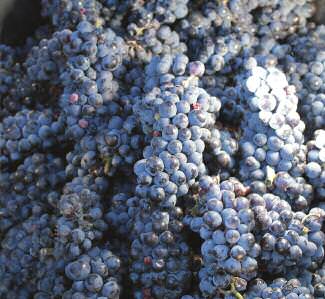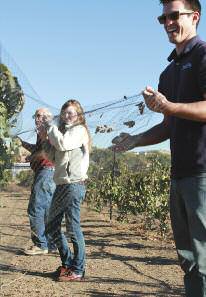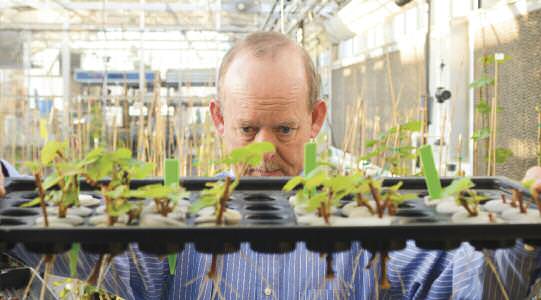drinkable reno-tahoe
WINE SCIENCE
UNR strives to put Northern Nevada on the map.
WRITTEN BY HEIDI BETHEL
PHOTOS BY ASA GILMORE, CHAR ECKMEYER, AND DR. GRANT CRAMER
In 1995, when Dr. Grant Cramer initiated the wine research program at the University of Nevada, Reno, he envisioned a simple trial investigation to determine the area’s potential to grow quality wine grapes. Today, with supportive research development, several test vineyards, and cultivated public interest, Cramer is paving the way to making Northern Nevada the next wine mecca.
One of the initial developments of UNR’s program was drought stress tolerance and the discovery that reducing the amount of irrigation improves the quality of grapes without much loss in production. In fact, by reducing water usage by 80 percent compared to previous years, Cramer and program participants discovered that grapes garnered better flavors, colors, and fruity aromas in the wines. In addition, the group discovered the grape gene best suited for cold tolerance and winter survival.
“In the beginning years, we wanted to see if we could grow grapes here and what the quality would be,” Cramer says. “The program evolved over time, and has continued to evolve into a big program where we’re constantly studying drought stress tolerance on grape vines and what makes flavor in grapes. We want to know more about the genes and environmental factors that influence flavors.”


Molecular momentum
The wine research program is recognized nationally and internationally. Cramer says that since 2002, the program has received millions of dollars for grape research, including a grant from the National Science Foundation to study grape functional genomics.
“We’re trying to understand the whole response of the organism by looking at its molecular properties,” he says. “The new technologies that we have today allow us to get a holistic picture of the grape vine, and we can understand the entire metabolic processes going on in one snapshot.”
Cramer explains that one of his main objectives is to evaluate the grapevines and find ways to keep them at optimum health in our local conditions.
“We aim to produce the best quality product we can get with very complex and cutting-edge technology,” he says. “This will ultimately help viticulture in the area.”
Testing and training
What started as an analysis of grapes and the area’s viability for vine growing has since become an incubator for Nevada’s winemaking potential. In 2004, with the inception of UNR’s Valley Road experimental winery, Cramer and his students began producing wine.
“We started out studying wine and now we’re producing it for the public. In the past, we were evaluating fruit characters, and now we’re making blends to show the potential of the wines for the area,” Cramer says. “That morphed into an outreach program. We’re convinced we can produce good quality wines here.”
The excitement for learning about Nevada wines has been shared by others in the community, so much so that the group hosts a wine class and tasting event twice a month.
“We’re trying to educate people not only on wine tasting; we’re essentially going through a viticulture workshop where we discuss certain topics relevant to what is going on in the field,” says Daniel Hopper, graduate research assistant for UNR’s wine research program. “It’s essentially a year-long Viticulture 101 on how to grow vines and enjoy wines made in Reno. And it’s growing.”
As a graduate of UNR, Heidi Bethel recognizes the hard work and dedication those participating in the wine research program have toward the area’s wine-growing potential.
Tasting Time
Viticulture and Wine Tasting Class
First and third Tuesdays of every month
5:30 – 7 p.m.
Valley Road Greenhouse Complex at the University of Nevada, Reno
Suggested donation: $10 per person
First 30 minutes is spent learning about the science of grape growing and winemaking, followed by local wine tasting. No tickets necessary. First come, first served (and it fills up quickly).


